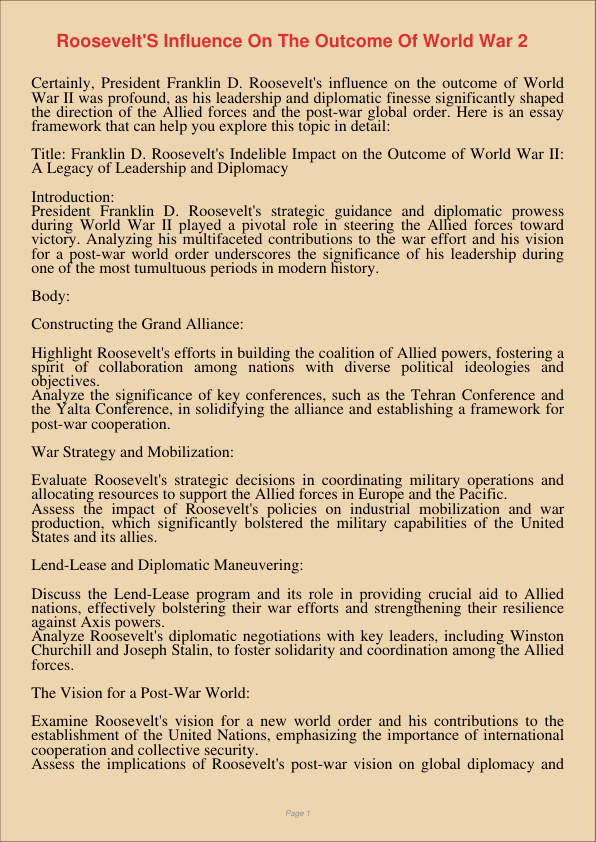RooseveltS Influence On The Outcome Of World War 2
Jan 12, 2024
world war 2
roosevelt
Visual Arts & Film Studies
Journalism & Communication
Certainly, President Franklin D. Roosevelt’s influence on the outcome of World War II was profound, as his leadership and diplomatic finesse significantly shaped the direction of the Allied forces and the post-war global order. Here is an essay framework that can help you explore this topic in detail:
Title: Franklin D. Roosevelt’s Indelible Impact on the Outcome of World War II: A Legacy of Leadership and Diplomacy
Introduction: President Franklin D. Roosevelt’s strategic guidance and diplomatic prowess during World War II played a pivotal role in steering the Allied forces toward victory. Analyzing his multifaceted contributions to the war effort and his vision for a post-war world order underscores the significance of his leadership during one of the most tumultuous periods in modern history.
Body:
Constructing the Grand Alliance:
Highlight Roosevelt’s efforts in building the coalition of Allied powers, fostering a spirit of collaboration among nations with diverse political ideologies and objectives. Analyze the significance of key conferences, such as the Tehran Conference and the Yalta Conference, in solidifying the alliance and establishing a framework for post-war cooperation.
War Strategy and Mobilization:
Evaluate Roosevelt’s strategic decisions in coordinating military operations and allocating resources to support the Allied forces in Europe and the Pacific. Assess the impact of Roosevelt’s policies on industrial mobilization and war production, which significantly bolstered the military capabilities of the United States and its allies.
Lend-Lease and Diplomatic Maneuvering:
Discuss the Lend-Lease program and its role in providing crucial aid to Allied nations, effectively bolstering their war efforts and strengthening their resilience against Axis powers. Analyze Roosevelt’s diplomatic negotiations with key leaders, including Winston Churchill and Joseph Stalin, to foster solidarity and coordination among the Allied forces.
The Vision for a Post-War World:
Examine Roosevelt’s vision for a new world order and his contributions to the establishment of the United Nations, emphasizing the importance of international cooperation and collective security. Assess the implications of Roosevelt’s post-war vision on global diplomacy and the shaping of the geopolitical landscape in the aftermath of World War II.
Conclusion: President Franklin D. Roosevelt’s leadership during World War II not only guided the Allied forces to victory but also laid the groundwork for a more stable and cooperative international order in the post-war era. By fostering collaboration, strategic foresight, and a commitment to global peace, Roosevelt’s legacy continues to resonate in contemporary efforts to promote international diplomacy and collective security.
By delving into these aspects, you can craft a comprehensive essay that underscores the pivotal role of President Franklin D. Roosevelt in shaping the outcome of World War II and the subsequent global order. Ensure to support your arguments with historical evidence, scholarly analyses, and expert insights to strengthen the credibility and depth of your exploration.
